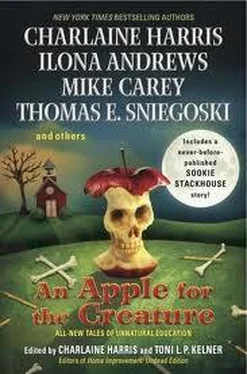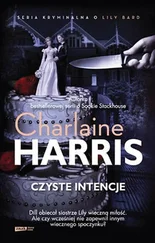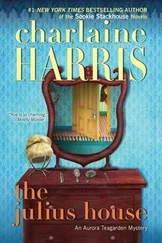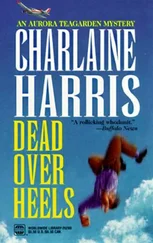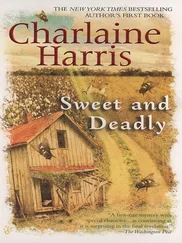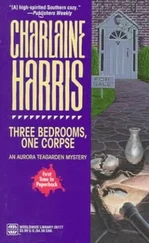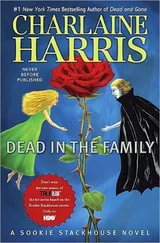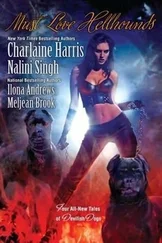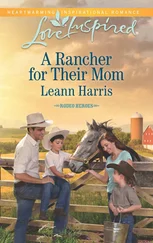I laid the poppet on the table. “You sure you want to do this yourself?”
The mother hesitated. “What does it take?”
“Burn it,” I said. “Or stab it. Twist its head to break his neck. Anything you do will kill him, slow or fast.”
She went pale. “That’s the Devil’s work.”
I offered back her money. “You said you wanted him gone.”
The mother stared at the doll and took a long, deep breath. I waited, already knowing the answer.
When I left her home, I carried the poppet in my satchel—and the money, too.
I walked toward the quarry.
—
The man was easy to find, as he was lunching with a girl no older than me, sixteen at best, pretty as morning with long blond hair and a face that might have been her mother’s, if her mother had ever been young and happy.
I watched them from the edge of the woods and ate my own lunch: a soft-boiled egg, a bit of bacon between some bread. Tapped my feet and rubbed my hands, trying to stay warm, watching the man and girl smile and laugh and make lovey-dovey with their eyes—and me, wondering all the while what that would feel like, wishing and afraid, but mostly wishing.
The girl left with a laugh and kiss. The man watched her go. His eyes, for her only. If he had ever wandered, I was certain he would never wander on her.
I started walking before he did, making my way through the woods so that I was waiting for him on the trail down to the quarry. He took his time, and was whistling when he saw me—though that stopped when he said, “Miss?”
Nothing hard in his face. Nothing bad, as was believed. The girl was right to love him. I had known it for weeks now, from the first time I seen them together.
I put my hand in the satchel, on the rough skin of the burlap doll. “I’ve come to warn you, mister.”
He frowned. “Who are you?”
“Someone who knows old Ruth,” I said, and something cold and small entered his eyes, natural as the ill, bone-chilling breeze passing around us on the trail. Ruth was like that breeze in these parts, known and accepted, and respected out of fear. Most granny women were, like as in the blood, born from the old country that was still rich in the veins of those who had settled these hills and valleys. Fear of a hoodoo woman was natural. Fear was how it had to be.
“Ruth has her eye on you,” I said. “When it comes, it’ll be her doing.”
He paled. “Done nothing wrong. Don’t even know her.”
I stepped back into the woods. “Remember what I told you. It was Ruth who ordered it.”
“Wait,” he began, reaching for me. I slipped away, but he did not try to follow. Instead he ran up the trail, away from the quarry. Chasing the girl, I thought. She was something he wanted to live for.
I pulled out the poppet, and twisted its head clear around.
—
The man was buried two days later, and the night after I slithered into that proper cemetery and dug for him. If he was watching from on high, I didn’t mind. I sawed off his hand, and wrapped it up tight.
—
I was good at digging for the dead. Ruth started me at the age of twelve, from necessity. It was time. I’d become a woman, my first bleed, and needles couldn’t be made from any old bone. So my own mother was first, and my grandmother after her—followed by her mother. Nothing less would do, Ruth said, and I believed her though it made me cry. Took a long while, too, and lucky for me my relatives were buried in the family plot, out in the hills where no one ever came.
All for sympathy, was something else Ruth taught me. Bones had to be sympathetic to make a hoodoo stitch work its wiles, and nothing was more in sympathy than a line of women, from mother to daughter and backward to beyond. Never mind any strife that might have pressed between generations. Who was left living mattered most to the dead. According to Ruth, that was me.
Though it seemed, as it had for some time, that it wasn’t just the bones of those come before that might matter in the stitching. Any bone, from a body with desire, might have a say in the power of a hoodoo.
Any bone at all.
—
Now, there were stories come down from the hills that I remembered being told even as a child, and the telling of them was still rich on the tongues of the people who settled in the valley and high country, away from the quarry. Tales of the banshee and hag-riders, and the little folk who Ruth thought she could consort with, though I’d never seen anything but a raccoon sip the milk she left out, nights. I don’t know if I believed in such tales, though I respected the possibility, given the power of the needle and stitch, which had to come from somewhere—and if not the world of the spirit then maybe God, though I did not think He would approve the use for which His gift had been put.
It certainly was not for God that I was a conspirator to murder. And I had no confidence that He had a greater hold of my soul than Ruth.
Took me four years to realize something might be shifty, and by then I was ten. I got it in my head to go raiding some jar of sweets that Ruth kept just for herself, and it wasn’t a minute after my first bite of peppermint that the pain started in, right in my stomach. I doubled over thinking I’d been stabbed, sure to find blood, but nothing was there but the certainty that my insides were going to spill outside.
Calling for Ruth did no good. She was standing right there, watching. Holding a doll made of pale cloth, large as a swaddled babe and cradled in her arms with a fork jabbed into its belly.
Ruth’s eyes, satisfied and cold. “Been soft on you. And now you try to steal from me. After everything I done to keep you whole.”
Well, it took me a week to walk after that.
But it gave me time to think.
—
That new doll, with the blue eyes and crooked nose, remained a silent presence. Ruth worked on it with a steadiness I’d not seen in years, taking care with every stitch, mumbling devotionals over her needles before she’d even thread them. I watched her clean those bone daggers each morning, and when it came time to fill that doll with the hoodoo, she made me go outside in the cold and practice my embroidery, claiming a need to concentrate in peace. It was no consequence to me. I knew what she was doing. Capturing a soul was no secret, even though she’d never taught me the way of it.
“Power makes you greedy,” Ruth said, seven days after needling that first stitch. “I’m no innocent in that regard, as you well know.”
I was standing beside the fireplace, bent over a tin pail that held a mixture of cow urine, fermented these last three weeks, and the smashed hulls of black walnuts. Preparing dye for the thread, spun with my own hands from wool shorn from the sheep that Ruth kept in a pen on the hill.
“Look at me,” she said.
The doll was in front of her on the table, soft limbs stretched out, soft body embroidered with runes and blooms and glimpses of eyes peering from behind twisting vines. I looked for only a moment and then settled on Ruth, who was eyeing me all speculative. I kept still.
“You have never been greedy,” she said, finally. “Never saw a sign of it in your eyes, and I been looking for years, since I showed you that first stitch.”
“I don’t want what you have,” I said truthfully.
Ruth grunted, and pushed herself off the chair. “Good girl.”
I hesitated. “Never asked who taught you .”
Oh, the smile that flitted across her mouth. Made me cold.
“My teacher,” Ruth murmured, stroking the bone needles laid out on the table. “My own granny, with her wiles. My mother had no gift for the stitch, but there was something in me, from the beginning.”
Читать дальше
